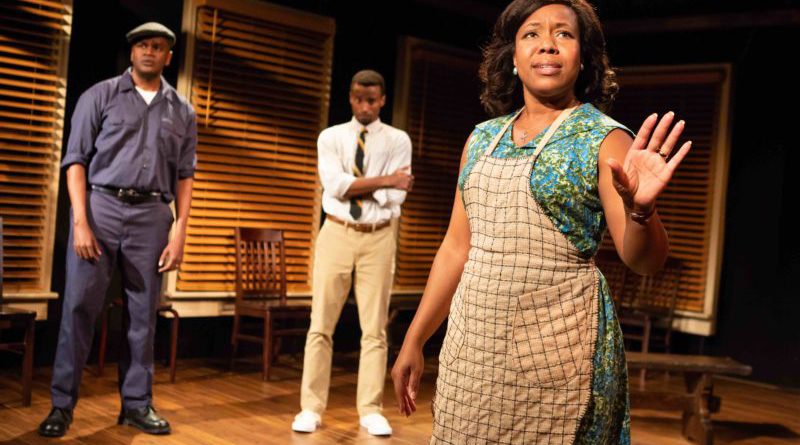INTERVIEW: Ensemble Studio Theatre develops topical play on gentrification
Photo: Shawn Randall, Sheldon Best and Lynnette R. Freeman star in Travisville at Ensemble Studio Theatre. Photo courtesy of Jeremy Daniel / Provided by Matt Ross PR with permission.
Travisville, playing through this weekend at the Ensemble Studio Theatre in New York City, is a headline-grabbing play about a group of black ministers who need to decide how to deal with white politicians calling for the displacement of a predominantly black neighborhood. The politicians claim a need for increased entertainment value, while the ministers see gentrification and racism.
William Jackson Harper (The Good Place and Broadway’s All the Way) wrote the play over several years in conjunction with the highly collaborative Ensemble Studio Theatre. Steve H. Broadnax III directs the ensemble, which includes Lynnette R. Freeman.
Freeman is an ensemble member of EST who has been a common presence on New York and regional stages. A member of the Jamal Jackson Dance Company, the actor is quite excited to bring Harper’s play to life, especially since she has been working on it for years.
Recently, Hollywood Soapbox talked with Freeman about Travisville. Here’s what she had to say …
On what inspired her to join this EST production …
“This particular production I’ve actually been a part of for a couple of years now because Will has been workshopping it for about eight years. I joined the team about five years ago, and so we did table reads. And then there was a bare bones production that was done about two years ago directed by Chris Chalk, so Will has been working on this play for quite some time now.
“Since I started working on it and being a part of the workshops, I loved the role. I’ve been playing the same role as well, just loving to see the evolution, what stays, what goes, and the different relationships and evolution of his writing and also to see which characters were staying because there was a whole other character that was in it that is now no longer in it. There were relationships that were changed, and so it has been really a pleasure. … I love this group of actors, and I love this story. And I think it’s definitely timely.”
On how she researched the topics and time period of the play …
“I definitely looked at the time period and physically look at what were black women doing in the early 1960s, like what was happening around that time, what would she have seen, what was a common occurence, what was happening in Texas because we talk about this being a town that is not quite a full city. It is a city, but it’s not huge, huge. What would have been around? What would have been happening? So that also helps inform how I feel, and then also just [finding out] the different things that inspired Will to write the show as well. …
“How best can I bring these things into my own life and how I see the world, and once that connection is started, then I can really play from a piece of truth and from stories that I have from my family, things that I’ve heard, other research about women at the time and African-Americans specifically at the time, and all this in New York and in New Jersey.”
On the necessity to bring Travisville to the stage now …
“I was very excited that it would be done because it is necessary now. We talk a lot about gentrification, and also in doing so, we do have to look at the racial and economic disparities that are happening with gentrification. Who is being moved out and many times not given the full amount because of things like urban blight, because property values might be low in an area? Even though it may seem like the area is not worth much, the moment it is seen as, OK, this could be an awesome thing, you just have to get these people out of there, all of us witness a boon. And who does that boon happen for? Certainly not people who are living there. Certainly not the people who get moved out.
On the history of discrimination informing the development of the play …
“Travisville is happening at a time that laws are enacted to uphold discriminatory practices and racism, and so it’s looking at that and also looking at 2018, looking at how sometimes legislation is done in order to make sure that certain people may not get to vote, changing of the rules. … Black and brown people in general bear the brunt of prison sentences, even for little things. The only difference between now 2018 and then is that we have technology to now videotape it, but even when it’s videotaped, it’s not necessarily even considered credible. It’s — why this person didn’t comply more with the police. Well, this is something this person was doing. They shouldn’t have been there. They shouldn’t have been X, Y and Z, and so I think that looking at some of the different themes that are raised in Travisville, not just about gentrification but also underlying pressure of society and looking at how institutionalized a lot of these different discriminatory forms and practices are in our fabric and the lifeblood of America to a certain extent.
“Then it was very overt. Now it’s a little bit more covert.”
By John Soltes / Publisher / John@HollywoodSoapbox.com
Travisville continues at the Ensemble Studio Theatre through Oct. 28. All remaining performances are currently sold out. Click here for more information and ticket information.

